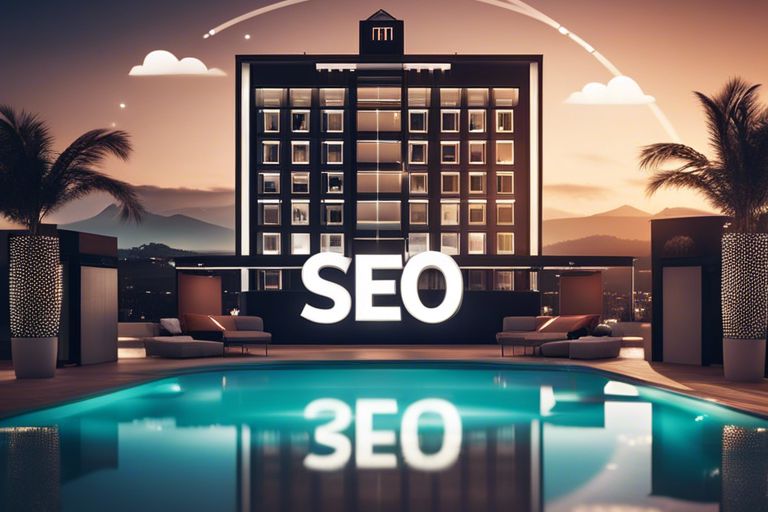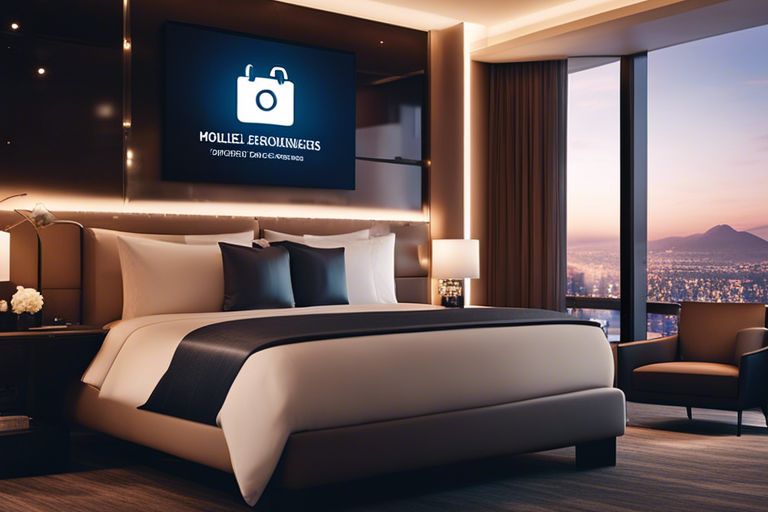Embark on a journey to demystify the complex world of search engine optimization (SEO) for hotels. In this comprehensive guide, we will uncover the most important strategies and techniques that will help your hotel website rise to the top of search engine rankings. From optimizing your website’s structure and content to understanding the dangerous pitfalls to avoid, this guide will provide you with the ultimate roadmap to achieving SEO success for your hotel.
Table of Contents
- 1 Understanding SEO: Types and Fundamentals
- 2 Step-by-Step Site Audit for Your Hotel Website
- 3 Keyword Research for Hotels
- 4 On-Page SEO Strategies for Hotels
- 5 Off-Page SEO Tactics to Boost Your Hotel’s Online Presence
- 6 Measuring SEO Success: KPIs and Analytics for Hotels
- 7 Advanced SEO Tips and Emerging Trends
- 8 Conclusion
- 9 FAQ
Key Takeaways:
- Keyword Research: Understanding the relevant keywords for your hotel’s target audience is crucial for successful SEO.
- User Experience: Providing a seamless and user-friendly experience on your website can improve search engine rankings and attract more bookings.
- Local SEO: Optimizing for local search can help your hotel appear in results for guests searching in your area.
- Content Strategy: Creating high-quality, relevant content can attract organic traffic and improve your hotel’s online visibility.
- Mobile Optimization: Ensuring your website is optimized for mobile devices is essential for reaching travelers using smartphones and tablets.

Understanding SEO: Types and Fundamentals
Some key elements of search engine optimization (SEO) include understanding the different types and fundamentals. It is important for hoteliers to grasp the various aspects of SEO in order to effectively optimize their online presence. Here are the primary types and fundamentals of SEO:
| Type | Fundamentals |
| Organic SEO | Keywords, content quality, link building, user experience |
| Paid SEO | PPC advertising, sponsored content, paid search results |
| On-Page SEO | Meta tags, headings, keyword optimization, content optimization |
| Off-Page SEO | Backlinks, social media signals, online reputation management |
| Technical SEO | Website speed, mobile-friendliness, schema markup, site architecture |
The key to effective SEO for hotels lies in understanding and leveraging these various types and fundamentals to enhance online visibility and drive targeted traffic to their websites. Importantly, this knowledge forms the foundation for implementing successful SEO strategies and achieving sustainable results.
Organic vs. Paid Search: Pros and Cons
On one hand, organic search engine optimization offers sustainable, long-term results and enhances the overall online presence of a hotel. It also helps in building credibility and trust with the audience. On the other hand, paid search allows for immediate visibility and can be highly targeted based on demographics, location, and user behavior. However, it requires ongoing investment and can become expensive over time.
| Organic Search | Paid Search |
| Long-term results | Immediate visibility |
| Builds credibility | Highly targeted |
| Sustainable online presence | Requires ongoing investment |
| Can become expensive |
On-Page, Off-Page, and Technical SEO: Definitions and Importance for Hotels
Any comprehensive SEO strategy for hotels involves a combination of on-page, off-page, and technical optimization. On-page SEO focuses on optimizing individual web pages to rank higher and earn more relevant traffic. Off-page SEO involves activities outside the website to improve its search engine rankings, while technical SEO deals with the non-content elements of a website.
With the increasing competition in the hospitality industry, hotel websites need to pay attention to on-page, off-page, and technical SEO to stay ahead in search engine rankings and attract more potential guests. Ensuring proper implementation of these strategies will lead to improved visibility, user experience, and ultimately, more bookings.
Step-by-Step Site Audit for Your Hotel Website
While optimizing your hotel’s website for search engines, it is crucial to conduct a comprehensive site audit. This process involves analyzing various aspects of your site to identify potential issues and areas for improvement. Below is a step-by-step guide to performing a site audit for your hotel website.
| Identifying Technical Issues | Assessing Content Quality and Relevance |
|
Technical issues refer to any problems related to the technical aspects of your website, such as page speed, mobile-friendliness, and crawlability. These issues can negatively impact your site’s performance in search engine results. |
Any assessment of content quality and relevance should involve a review of your website’s existing content, including text, images, and multimedia. This will help determine if the content is engaging, informative, and relevant to your target audience and keywords. |
Identifying Technical Issues
Technical issues refer to any problems related to the technical aspects of your website, such as page speed, mobile-friendliness, and crawlability. These issues can negatively impact your site’s performance in search engine results. It is important to address these issues promptly to ensure that your site is accessible and user-friendly for both visitors and search engine crawlers.
Assessing Content Quality and Relevance
Any assessment of content quality and relevance should involve a review of your website’s existing content, including text, images, and multimedia. This will help determine if the content is engaging, informative, and relevant to your target audience and keywords. For instance, outdated content or duplicate content can hinder your site’s performance in search results.
Issues
Assessing the backlink profile of your hotel website is crucial to understanding its authority and credibility. Issues such as toxic or low-quality backlinks can have a detrimental impact on your site’s search engine rankings. It is important to identify and disavow these harmful backlinks to avoid potential penalties from search engines.
Assessing the backlink profile of your hotel website is crucial to understanding its authority and credibility. Backlinks from high-authority and relevant websites can significantly boost your site’s search engine rankings. However, low-quality or irrelevant backlinks can have the opposite effect and should be addressed to improve your site’s overall backlink profile.
Keyword Research for Hotels
Not sure where to start with your hotel’s search engine optimization? Keyword research is a critical first step. By understanding the terms and phrases your potential guests are using to search for hotels, you can optimize your website to attract more organic traffic. For a comprehensive guide to keyword research in the context of hotel SEO, I recommend checking out Top SEO Strategies for Hotel Industry: A Complete Guide by Shyam Singh.
Tools and Techniques for Finding the Right Keywords
Right keyword research tools and techniques can help you uncover the most relevant and valuable keywords for your hotel website. Utilize tools like Google Keyword Planner, SEMrush, and Moz Keyword Explorer to identify high-volume keywords related to your hotel’s location, amenities, and offerings. In addition, consider using techniques such as brainstorming sessions with your team, analyzing customer reviews, and monitoring industry trends to discover new keyword opportunities.
Furthermore, leveraging long-tail keywords specific to your hotel’s unique selling points can help you capture more qualified traffic and improve the chances of conversion. When selecting keywords, pay attention to user search behavior, search volume, competition level, and relevance to your hotel’s brand.
Understanding User Intent: Navigational, Informational, Transactional
Informational user intent occurs when a person is seeking general information about a topic, such as “best hotels in New York City.” Understanding this intent can help you create content that addresses common questions and concerns potential guests may have, positioning your hotel as a valuable resource in the decision-making process.
Plus, by incorporating transactional keywords like “book a room at luxury hotel” or “resort deals in [destination]” in your SEO strategy, you can capture users who are ready to make a reservation. Analyzing user intent and aligning your keyword strategy accordingly allows you to cater to various stages of the booking journey, from research and consideration to the final decision to book.
Competitor Keyword Analysis
To gain a competitive edge in the crowded hotel industry, it’s essential to conduct competitor keyword analysis. By identifying which keywords your competitors are ranking for, you can uncover valuable insights into gaps in your own keyword strategy. Look for opportunities to target keywords with lower competition but high search volume, as well as long-tail keywords that your competitors may have overlooked.
User conducting comprehensive competitor keyword analysis can also reveal untapped niche keywords that align with your hotel’s unique offerings, allowing you to differentiate your SEO approach and attract a more targeted audience.
On-Page SEO Strategies for Hotels
Despite the ever-changing landscape of search engine algorithms, on-page SEO remains a critical aspect of a successful digital marketing strategy for hotels. By implementing effective on-page SEO strategies, hotels can improve their online visibility, attract more organic traffic, and ultimately increase their bookings and revenue.
Optimizing Title Tags and Meta Descriptions
Any hotel looking to enhance its on-page SEO should prioritize the optimization of title tags and meta descriptions. These elements play a crucial role in conveying the relevance of a hotel’s web pages to search engines and potential guests. Crafting compelling and descriptive title tags and meta descriptions that include relevant keywords and accurately represent the content of the page can significantly improve click-through rates and overall search engine rankings.
High-Quality Content Creation: Text, Images, and Videos
Text, images, and videos are foundational elements of a hotel’s online presence, and their optimization is essential for on-page SEO success. High-quality, engaging, and informative content not only provides value to website visitors but also signals to search engines that the hotel’s website is a valuable resource. Hotels should focus on creating unique and compelling content that showcases their property, amenities, and local attractions, while incorporating relevant keywords to enhance visibility and credibility.
Hotels can differentiate themselves by producing visually stunning images and informative videos that highlight their unique selling points, such as breathtaking views, luxurious accommodations, and exceptional guest experiences. By integrating relevant keywords into the alt text, file names, and descriptions of images and videos, hotels can further improve their on-page SEO performance and attract organic traffic from image and video searches.
Internal Linking Structure Improvement
For hotels aiming to strengthen their on-page SEO, internal linking structure improvement is a pivotal strategy. Strategic internal linking not only enhances the user experience by guiding visitors to relevant content but also distributes the link equity across the website, thereby boosting the authority and visibility of important pages. By incorporating relevant anchor text and linking to valuable resources, hotel websites can improve their search engine rankings and ensure that both users and search engine crawlers can navigate the site effectively.
Content silos and hub pages can be leveraged to organize related content and establish thematic relevance, while also promoting deeper engagement with the hotel’s website. When executed thoughtfully, internal linking can contribute to a cohesive website structure and elevate the overall on-page SEO performance of a hotel’s digital assets.
Schema Markup for Enhanced Visibility
An often overlooked but highly impactful on-page SEO strategy for hotels is the implementation of schema markup. This structured data markup provides search engines with detailed information about a hotel’s property, including its location, amenities, room types, and ratings. By incorporating schema markup into their website code, hotels can enhance the visibility of their listings in search engine results, potentially earning rich snippets and other prominent features that attract attention and clicks from search engine users.
Improvement in on-page SEO performance can be achieved by using schema markup to specify essential details such as room rates, availability, and special offers, thereby increasing the likelihood of being showcased in relevant search results and capturing the interest of potential guests at critical decision-making moments.
Off-Page SEO Tactics to Boost Your Hotel’s Online Presence
For hotels looking to improve their online visibility and attract more guests, off-page SEO tactics play a crucial role. These strategies involve optimizing your website’s presence across the web, beyond the confines of your own site. To learn more about off-page SEO and other hotel SEO tips, check out our Hotel SEO: The Essential Guide (Free Checklist + Video ….
Building a Strong Backlink Profile: Tips and Strategies
OffPage SEO efforts should focus on building a diverse and high-quality backlink profile for your hotel’s website. Seek opportunities to acquire backlinks from reputable travel and hospitality websites, as well as local directories and review platforms. Crafting engaging and shareable content can also attract natural backlinks from other websites. Utilize guest blogging opportunities to secure backlinks from relevant blogs and publications. Recognizing the importance of anchor text diversity and link relevancy is vital for a healthy backlink profile.
Social Media and Local Listings for Hotels
Presence on social media platforms and local business listings is essential for hotels to connect with potential guests. Regularly updating your social media accounts with engaging content and managing your local business listings can boost your hotel’s visibility in search results. Interacting with followers and responding to reviews can also positively impact your hotel’s online reputation.
The strategic use of hashtags and geotags in your social media posts can further enhance your hotel’s online visibility and attract users who are searching for nearby accommodation and experiences.
Guest Blogging and Influencer Partnerships
Blogging on relevant travel and lifestyle websites can showcase your hotel to a wider audience while building valuable backlinks. Collaborating with influencers in the travel and hospitality industry can amplify your reach and generate buzz about your hotel. By offering unique experiences and content, you can establish your hotel as a sought-after destination for travelers.
Profile your hotel in front of a curated audience through influencer partnerships and guest blogging opportunities, ultimately driving more traffic to your website and boosting your online reputation.
Measuring SEO Success: KPIs and Analytics for Hotels
Unlike other marketing strategies, the success of your hotel’s SEO efforts can be accurately measured using key performance indicators (KPIs) and analytics. By tracking the right metrics, you can gain valuable insights into the effectiveness of your SEO campaigns and make data-driven decisions to improve your hotel’s online visibility and performance.
Setting Up and Using Google Analytics
Measuring the impact of your hotel’s SEO efforts starts with setting up and using Google Analytics. This powerful tool provides in-depth insights into your website’s traffic, user behavior, and conversion rates. By tracking metrics such as organic traffic, bounce rate, and conversion goals, you can assess the impact of your SEO strategies and identify areas for improvement.
Monitoring the performance of specific landing pages, tracking the source of incoming traffic, and analyzing keyword performance are essential for optimizing your hotel’s online presence. By leveraging the data provided by Google Analytics, you can refine your SEO tactics and enhance your hotel’s digital marketing strategy for optimal results.
Key Performance Indicators (KPIs) to Monitor
Monitor key performance indicators (KPIs) such as organic traffic, keyword rankings, and conversion rates to gauge the effectiveness of your hotel’s SEO initiatives. By keeping a close eye on these KPIs, you can identify trends, spot potential issues, and capitalize on opportunities to improve your hotel’s search engine visibility and drive qualified traffic to your website.
To ensure a comprehensive understanding of your hotel’s SEO performance, it’s essential to monitor a range of KPIs, including click-through rates, dwell time, and backlink quality. These metrics provide valuable insights into user engagement, content effectiveness, and the overall authority of your hotel’s website in search engine results.
Regular Reporting and Analysis for Continuous Improvement
Hotels should implement a systematic approach to reporting and analyzing SEO data to drive continuous improvement. By establishing regular reporting cycles and conducting in-depth analysis of KPIs, hotels can identify patterns, measure progress, and make informed decisions to refine their SEO strategies.
Indicators such as trends in organic traffic, changes in keyword rankings, and fluctuation in conversion rates should be closely monitored and analyzed to adapt your SEO tactics effectively. By consistently optimizing your hotel’s digital presence based on data-driven insights, you can stay ahead of the competition and maximize your online visibility and revenue potential.

Advanced SEO Tips and Emerging Trends
Now that you have mastered the foundational aspects of search engine optimization for hotels, it’s time to delve into some advanced SEO tips and emerging trends that can give your hotel website a competitive edge in the ever-evolving digital landscape.
- Stay updated with the latest trends by regularly reading industry blogs and attending SEO conferences and webinars. Implement the recommendations offered in the SEO for Hotels: A Complete Guide for 2024 to ensure you are ahead of the curve.
- Invest in cutting-edge tools and technologies that can help you analyze and optimize your website’s performance and user experience.
Mobile Optimization and the Importance of Load Speed
Load speed and mobile optimization are crucial elements of modern SEO. With the majority of users accessing the internet via mobile devices, fast load times and mobile-friendly designs are non-negotiable. Ensure that your website is optimized for mobile devices and that it loads quickly to provide a seamless user experience.
Voice Search Optimization
Speed is not only important in load times, but also in voice search optimization. As more users embrace voice search technology, it is essential to optimize your content for conversational queries. Understand the importance of long-tail keywords and natural language in voice search optimization to stay ahead of the game.
Tips for voice search optimization: Incorporate FAQ pages, create content that answers specific questions, and optimize for local search phrases such as “near me” and “around here.”
The Role of Artificial Intelligence in SEO
Voice search is just the beginning of the impact of artificial intelligence (AI) on SEO. AI is revolutionizing the way search engines process and understand user queries, and it is essential to optimize your website to align with AI algorithms. Stay informed about the latest AI advancements and how they impact search engine ranking factors to adjust your strategy accordingly.
Optimization for AI involves leveraging machine learning, natural language processing, and semantic search to ensure that your website’s content is well-aligned with the evolving algorithms.
Conclusion
With this in mind, it is crucial for hotels to have a strong understanding of search engine optimization in order to improve their online visibility and ultimately drive more traffic to their website. By implementing the strategies outlined in this guide, hotels can ensure that they are optimizing their online presence for search engines and reaching potential guests in a competitive online market.
It is important for hotels to continuously monitor their website’s performance and stay informed about the latest trends in search engine optimization to stay ahead of their competition. By staying up-to-date with SEO best practices, hotels can continue to improve their online visibility and attract more guests to their property.
FAQ
Q: What is search engine optimization (SEO) for hotels?
A: Search engine optimization (SEO) for hotels is the process of improving the visibility and ranking of a hotel’s website on search engines like Google. This involves optimizing various elements of the website to increase organic traffic and drive potential guests to the site.
Q: Why is SEO important for hotels?
A: SEO is important for hotels because it helps them to stand out in a highly competitive online market. By improving their search engine rankings, hotels can attract more traffic, increase bookings, and ultimately boost revenue.
Q: What are the key components of SEO for hotels?
A: The key components of SEO for hotels include keyword research, on-page optimization, content creation, local SEO, website speed and mobile-friendliness, link building, and monitoring and reporting. Each of these components plays a crucial role in improving a hotel’s online presence and visibility.
Q: How long does it take to see results from SEO for hotels?
A: The timeline for seeing results from SEO for hotels can vary depending on the competitiveness of the market and the specific strategy implemented. Generally, significant improvements can be seen within 3 to 6 months, but it may take up to a year to achieve substantial ranking and traffic growth.
Q: What are the common SEO mistakes that hotels should avoid?
A: Common SEO mistakes that hotels should avoid include keyword stuffing, neglecting local SEO, ignoring mobile optimization, not creating high-quality and relevant content, and neglecting the importance of user experience. It’s important for hotels to stay updated with the latest SEO trends and best practices to avoid these pitfalls.










